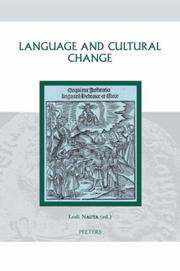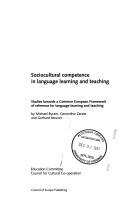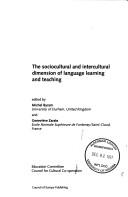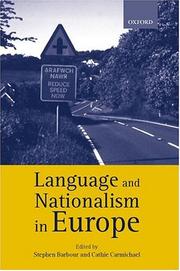| Listing 1 - 10 of 14 | << page >> |
Sort by
|
Book
ISBN: 3406378889 9783406378881 Year: 1994 Publisher: München : Deutscher Taschenbuch Verlag (DTV),
Abstract | Keywords | Export | Availability | Bookmark
 Loading...
Loading...Choose an application
- Reference Manager
- EndNote
- RefWorks (Direct export to RefWorks)
Language, Universal --- Language and culture --- Langage --- --Philosophie --- --Language, Universal --- Language and culture - Europe --- Philosophie --- Langue universelle --- Langues imaginaires
Book

ISBN: 1283398656 9786613398659 3110220261 9783110220261 9781283398657 9783110220254 3110220253 Year: 2011 Publisher: Berlin Boston
Abstract | Keywords | Export | Availability | Bookmark
 Loading...
Loading...Choose an application
- Reference Manager
- EndNote
- RefWorks (Direct export to RefWorks)
Open publication› The Languages and Linguistics of Europe: A Comprehensive Guide is part of the multi-volume reference work on the languages and linguistics of the continents of the world. The book supplies profiles of the language families of Europe, including the sign languages. It also discusses the areal typology, paying attention to the Standard Average European, Balkan, Baltic and Mediterranean convergence areas. Separate chapters deal with the old and new minority languages and with non-standard varieties. A major focus is language politics and policies, including discussions of the special status of English, the relation between language and the church, language and the school, and standardization. The history of European linguistics is another focus as is the history of multilingual European 'empires' and their dissolution. The volume is especially geared towards a graduate and advanced undergraduate readership. It has been designed such that it can be used, as a whole or in parts, as a textbook, the first of its kind, for graduate programmes with a focus on the linguistic (and linguistics) landscape of Europe.
Linguistics --- Multilingualism --- Language and culture --- Linguistic science --- Science of language --- Language and languages --- Europe --- Languages. --- Culture --- Linguistics - Europe --- Multilingualism - Europe --- Language and culture - Europe --- General Linguistics. --- Languages of Europe.
Book
ISBN: 8842042870 9788842042877 Year: 1993 Publisher: Bari Laterza
Abstract | Keywords | Export | Availability | Bookmark
 Loading...
Loading...Choose an application
- Reference Manager
- EndNote
- RefWorks (Direct export to RefWorks)
Philosophy of language --- Language and languages. --- Language, Universal. --- Language and culture --- Language, Universal --- Langage --- --Philosophie --- --805.0 <09> --- -Language and languages --- Interlinguistics --- International language --- Language, International --- Language, World --- Universal language --- World language --- Foreign languages --- Languages --- Anthropology --- Communication --- Ethnology --- Information theory --- Meaning (Psychology) --- Philology --- Linguistics --- Culture and language --- Culture --- Italiaans. Italiaanse taalkunde--Geschiedenis van ... --- 805.0 <09> --- 805.0 <09> Italiaans. Italiaanse taalkunde--Geschiedenis van ... --- --Philosophy of language --- Language and languages --- Italiaans. Italiaanse taalkunde--Geschiedenis van .. --- --Language and culture --- Italiaans. Italiaanse taalkunde--Geschiedenis van . --- Italiaans. Italiaanse taalkunde--Geschiedenis van --- Language and culture - Europe. --- Language and culture - Europe --- Philosophie

ISBN: 9042917571 9789042917576 Year: 2006 Volume: 24 Publisher: Leuven Peeters
Abstract | Keywords | Export | Availability | Bookmark
 Loading...
Loading...Choose an application
- Reference Manager
- EndNote
- RefWorks (Direct export to RefWorks)
Linguistics --- History of civilization --- anno 1400-1499 --- anno 1500-1599 --- Beschavingsgeschiedenis --- Geschiedenis van de Middeleeuwen --- Geschiedenis van de Renaissance --- Histoire de la Renaissance --- Histoire des civilisations --- Histoire du Moyen Age --- Humanism --- Language and culture --- Latin language, Medieval and modern --- History --- Culture and language --- Culture --- Language and culture - Europe - History - Congresses. --- Humanism - Congresses. --- Latin language, Medieval and modern - History - Congresses.
Book
ISBN: 9781107001138 9780511734762 9781107693654 1107001137 9780511992766 0511992769 1107220114 0511993994 1282967118 9786612967115 0511991770 0511990790 0511989008 051173476X 051198720X 1107693659 Year: 2011 Volume: 83 Publisher: Cambridge Cambridge University Press
Abstract | Keywords | Export | Availability | Bookmark
 Loading...
Loading...Choose an application
- Reference Manager
- EndNote
- RefWorks (Direct export to RefWorks)
"Translation and commentary are often associated with institutions and patronage; but in Italy around the time of Dante, widespread vernacular translation was mostly on the spontaneous initiative of individuals. While Dante is usually the starting point for histories of vernacular translation in Europe, this book demonstrates that The Divine Comedy places itself in opposition to a vast vernacular literature already in circulation among its readers. Alison Cornish explores the anxiety of vernacularization as expressed by translators and contemporary authors, the prevalence of translation in religious experience, the role of scribal mediation, the influence of the Italian reception of French literature on that literature, and how translating into the vernacular became a project of nation-building only after its virtual demise during the Humanist period. Vernacular translation was a phenomenon with which all authors in thirteenth- and fourteenth-century Europe - from Brunetto Latini to Giovanni Boccaccio - had to contend"--
Translating and interpreting --- Language and culture --- Italian literature --- Humanism in literature --- History --- History and criticism --- Italy --- Intellectual life --- Interpretation and translation --- Interpreting and translating --- Language and languages --- Literature --- Translation and interpretation --- Translators --- Translating --- Humanism in literature. --- History and criticism. --- Arts and Humanities --- Culture --- Translating and interpreting - Italy - History - To 1500 --- Language and culture - Europe --- Italian literature - History and criticism --- Italy - Intellectual life - 1268-1559

ISBN: 9287132615 9789287132611 Year: 1997 Publisher: Strasbourg Council of Europe
Abstract | Keywords | Export | Availability | Bookmark
 Loading...
Loading...Choose an application
- Reference Manager
- EndNote
- RefWorks (Direct export to RefWorks)
Language and languages --- Sociolinguistics --- Language and culture --- Study and teaching --- #A9710A --- Langage et langues --- Sociolinguistique --- Langage et culture --- Etude et enseignement --- Language and languages - Study and teaching - Europe --- Sociolinguistics - Europe --- Language and culture - Europe --- Linguistics --- Sociology --- Integrational linguistics (Oxford school) --- Culture
Book
ISBN: 9781842174104 184217410X 9781842174753 1842174754 Year: 2012 Volume: 15 Publisher: Oxford : Oxbow,
Abstract | Keywords | Export | Availability | Bookmark
 Loading...
Loading...Choose an application
- Reference Manager
- EndNote
- RefWorks (Direct export to RefWorks)
Civilization, Celtic --- Celts --- Ethnoarchaeology --- Celtic antiquities --- Celtic languages --- Language and culture --- Inscriptions, Celtic --- Celtes --- Langues celtiques --- Inscriptions celtiques --- Langage et culture --- Ethnoarchéologie --- Origin --- History --- Origines --- Congresses --- Origin. --- History. --- Origines. --- Civilization, Celtic - Congresses --- Celts - Origin - Congresses --- Ethnoarchaeology - Europe - Atlantic Coast Region - Congresses --- Celtic antiquities - Congresses --- Celtic languages - History - Congresses --- Language and culture - Europe - Atlantic Coast Region - Congresses --- Ethnoarchéologie

ISBN: 9287132569 9789287132567 Year: 1997 Publisher: Strasbourg : Council of Europe,
Abstract | Keywords | Export | Availability | Bookmark
 Loading...
Loading...Choose an application
- Reference Manager
- EndNote
- RefWorks (Direct export to RefWorks)
Languages, Modern --- Sociolinguistics --- Language and culture --- Intercultural communication --- Study and teaching --- Enseignement des langues. --- Facteurs culturels. --- Intercultural communication. --- Interculturele communicatie. --- Language and culture. --- Langues vivantes. --- Moderne talen. --- Socioculturele factoren. --- Sociolinguistics. --- Taalonderwijs. --- Study and teaching. --- Europe. --- Languages, Modern - Study and teaching - Europe. --- Sociolinguistics - Europe. --- Language and culture - Europe. --- Intercultural communication - Europe.

ISBN: 0198236719 9780198236719 Year: 2000 Publisher: Oxford Oxford University Press
Abstract | Keywords | Export | Availability | Bookmark
 Loading...
Loading...Choose an application
- Reference Manager
- EndNote
- RefWorks (Direct export to RefWorks)
Sociolinguistics --- National movements --- Europe --- Nationalism --- Language and culture --- -Nationalism --- -#SBIB:309H518 --- #SBIB:321H81 --- 242 Nationaliteitenproblemen, Nationalisme --- 640 Taal --- Consciousness, National --- Identity, National --- National consciousness --- National identity --- International relations --- Patriotism --- Political science --- Autonomy and independence movements --- Internationalism --- Political messianism --- Culture and language --- Culture --- Verbale communicatie: sociologie, antropologie, sociolinguistiek --- Westerse politieke en sociale theorieën vanaf de 19e eeuw : nationalisme, corporatisme, fascisme, nationaal socialisme, rechtsextremisme, populisme --- Council of Europe countries --- Eastern Hemisphere --- Eurasia --- Languages --- -Political aspects. --- #SBIB:309H518 --- Political aspects. --- Nationalism - Europe. --- Language and culture - Europe.
Book
ISBN: 9782913217423 2913217427 Year: 2016 Publisher: Paris Collège de France. Institut des hautes études japonaises
Abstract | Keywords | Export | Availability | Bookmark
 Loading...
Loading...Choose an application
- Reference Manager
- EndNote
- RefWorks (Direct export to RefWorks)
Le colloque « Hiéroglossie II : Les textes fondateurs » qui s’est tenu au Collège de France les 8 et 9 juin 2016 se proposait de poursuivre l’examen du phénomène de hiérarchisation des langues conçue comme l’un des facteurs dynamiques de leur histoire, puisque toute hiérarchisation a pour destin d’être remise en question. L’établissement d’un texte sacré est sans doute un élément primordial dans la constitution d’un réseau hiéroglossique, mais il existe des textes qui, sans s’être vu conférer la dignité de sacrés, peuvent cependant être considérés comme le point de départ d’une tradition langagière répétant, dans un autre ordre, un processus analogue à ce qui s’est passé dans le domaine religieux avant de s’étendre à l’ensemble d’une culture.Ici encore, la plus grande liberté a été laissée aux participants pour proposer leur propre vision d’un texte fondateur. Si certains choix s’admettent naturellement, d’autres sont plus inattendus, mais toutes les contributions montrent l’importance décisive d’un texte référentiel comme médiation d’un destin langagier. Le Kojiki est le garant a posteriori de l’indépendance de la langue japonaise, le Beowulf anglo-saxon est remis à l’honneur grâce au succès du Seigneur des anneaux, qui s’est lui-même inspiré du Kalevala finnois, jusque dans l’élaboration de langues imaginaires.Chacune des treize contributions propose ainsi une manière d’aborder les grands et moins grands textes dans une perspective dynamique d'ouverture sur l’histoire des langues.
Language and culture --- Literature --- History and criticism --- J5500.10 --- J1912.10 --- J5920 --- S12/0350 --- Japan: Literature -- history and criticism -- premodern, ancient and earliest --- Japan: Religion -- Shintō -- sacred writings, teachings -- histories, mythologies --- Japan: Literature -- premodern fiction and prose ( -1868) --- China: Philosophy and Classics--Chunqiu 春秋 Spring and Autumn Annals, Zuozhuan 左傳 --- Language and culture - Japan - Congresses --- Language and culture - China - Congresses --- Language and culture - Europe - Congresses --- Literature - History and criticism - Congresses
| Listing 1 - 10 of 14 | << page >> |
Sort by
|

 Search
Search Feedback
Feedback About UniCat
About UniCat  Help
Help News
News